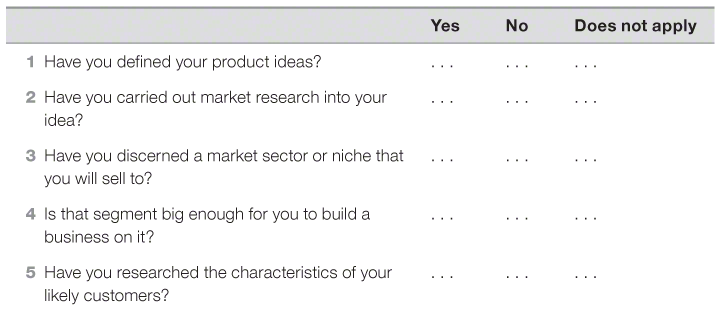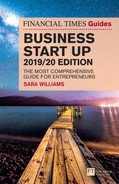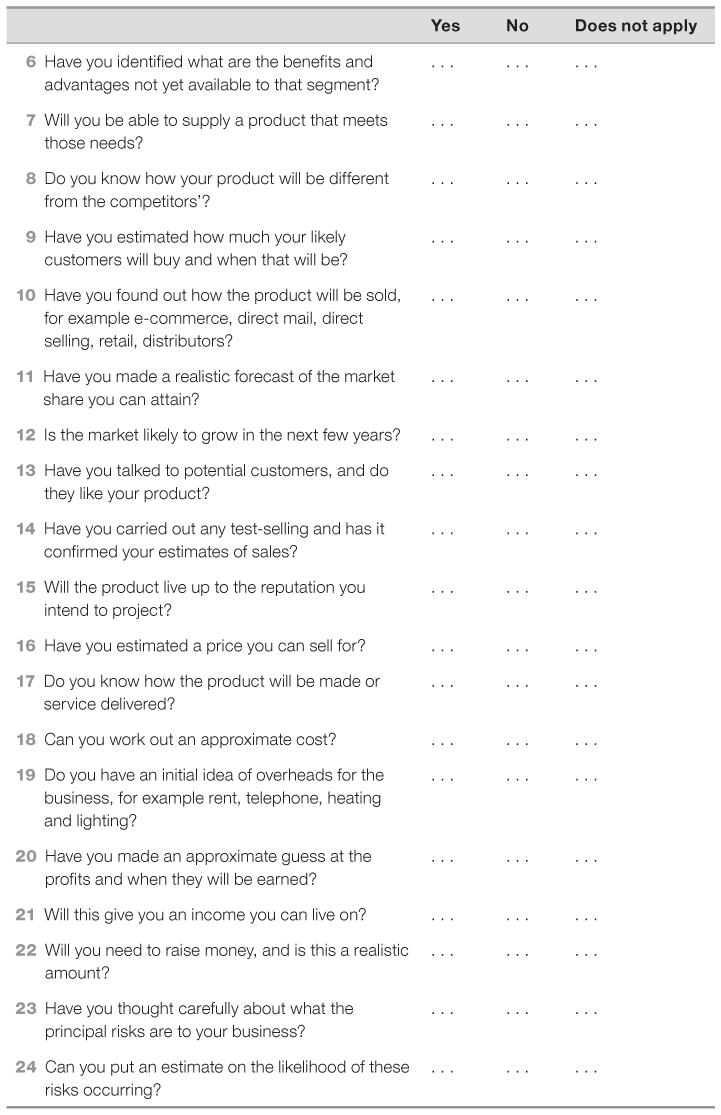Are you sure?
Every would-be entrepreneur should take stock before undertaking the final commitment; reassessments are a vital part of the decision process. Are you the right person? Have you got the necessary skills? Will you be able to earn enough to live on? Is your idea the best one?
What is in this chapter?
This chapter draws together all the key points made in the previous chapters, presenting them in a series of four checklists. This should allow you to reconsider previous decisions to confirm that you are on the right road. The checklists are you (see below), your family (p. 35), your skills (p. 36) and your idea (p. 39).
Checklist: you
Underline the word in each answer that best describes how you fit each question. You can also ask friends, colleagues or relatives to fill in the checklist about you, so that you can obtain an external view of your character and fitness for self-employment.
- Can you work long hours?
(1) Always
(2) Sometimes
(3) Occasionally
(4) Never - Do you have persistence and stamina?
(1) Always
(2) Most of the time
(3) Occasionally
(4) Rarely - Is this business more important than, for example, leisure or family?
(1) Completely
(2) Much more
(3) As important
(4) Less important - If the business struggled for five years, would you keep going?
(1) Yes, easily
(2) Yes, fairly easily
(3) Yes, with difficulty
(4) No - Is financial success your main guide to what you have achieved?
(1) Completely
(2) Mainly
(3) Partially
(4) Not at all - Are you thought of as a survivor?
(1) Always
(2) Usually
(3) Occasionally
(4) Never - If you were in a tight corner, would you be able to come up with an original way out?
(1) Frequently
(2) Sometimes
(3) Rarely
(4) Never - Do you keep going until a task is completed?
(1) Always
(2) Usually
(3) Sometimes
(4) Occasionally - Are problems a challenge?
(1) Always
(2) Usually
(3) Sometimes
(4) Never - Can you live with insecurity about job and income?
(1) Yes, easily
(2) Yes, fairly easily
(3) Yes, with difficulty
(4) No - Are you self-confident?
(1) Yes, always
(2) Yes, usually
(3) Sometimes lack confidence
(4) No - How do you view failure?
(1) Opportunity to learn
(2) A disappointment
(3) A setback
(4) A disaster - Can you take criticism?
(1) Always listen; may reject
(2) Always accept
(3) Don’t like it
(4) Always reject - Do you ask for comments on your performance so that you can do something better next time?
(1) Always
(2) Usually
(3) Sometimes
(4) Rarely - Do you believe your success will be dependent on outside factors?
(1) Strongly disagree
(2) Disagree
(3) Agree sometimes
(4) Agree always - Do you like being the leader in situations where you can be assessed?
(1) Very much
(2) Quite a lot
(3) Not really
(4) Not at all - Are you good at finding the right person or source to help you to achieve what you want?
(1) Very good
(2) Quite good
(3) Not very good
(4) Poor - Do you recognise when you need help?
(1) Always
(2) Usually
(3) Sometimes
(4) Never - Do you set your own high standards to compete against?
(1) Always
(2) Usually
(3) Sometimes
(4) Never - In the past, which sort of risks have you preferred taking?
(1) Calculated
(2) High risks
(3) Low risks
(4) Seldom take risks - Can you identify which decisions are important and which not?
(1) Yes, always
(2) Yes, usually
(3) Yes, sometimes
(4) No - Can you delegate to others?
(1) Yes, when appropriate
(2) Yes, sometimes
(3) With difficulty
(4) No - How is your health?
(1) Very good
(2) Good
(3) Quite good
(4) Poor
When you have completed the checklist, look at the pattern of underlined words. The more underlined answers 1 and 2, the greater your probable success as a business owner.
Checklist: your family
If you are single, you may not need to consider this section. But if you have a husband, wife, partner and/or children, involving them in the decision to go it alone is important. Starting a business is an all-embracing existence, and your family life is unlikely to remain the same after taking the plunge. They will need to understand that the home atmosphere should be very supportive, particularly during the early business problems.
Your family may also turn out to be an important business resource. They can provide extra input in all you do: clerical, manual and problem-solving, for example. With a family, deciding to found an enterprise is likely to be more successful as a family decision. Having said that, many succeed without the support of their families; but, in this case, the strain can be severe. In the extreme, the choice may be your business or your relationship.
In the following checklist, cross out whichever is inapplicable:
When you have completed your family checklist, the more times you have answered ‘yes’ the better prepared you are for starting your business.
Checklist: your skills
This checklist should help you to look honestly at what you can do well and what you do badly. If there are skills you lack, this does not mean that you cannot go ahead. But you need to compensate:
- Be trained or seek advice from an enterprise agency or other advice body.
- Fund the business so you can employ those skills that are lacking.
- Use mentors, counsellors or professional advisers, if appropriate.
- Use online platforms or large web sites, such as Amazon or eBay to market and provide support
- Start off your business in a more limited manner, see Chapter 2 ‘Less than 100 per cent’.
Financial
As you answer each question, underline the appropriate word or words:
1 Have you used an accounting software program to record business activity?
many times
on a few occasions
not at all
2 Have you had to chase bad debts owed by your customers (p. 335)?
yes, frequently
yes, sometimes
no, not at all
3 Have you ever installed a system of credit control (p. 333)?
yes
no
4 Have you ever negotiated credit terms with a supplier (p. 339)?
yes
no
5 What is your experience of drawing up cash flows (p. 286)?
extensive
a little
none at all
6 Do you understand the importance of controlling cash (p. 329)?
yes
no
7 What is your experience of drawing up budgets (p. 328)?
extensive
a little
none at all
8 Is break-even analysis a technique you have used before (p. 324)?
yes, frequently
yes, sometimes
no, not at all
9 Do you know when and how you would use:
(a) An overdraft or a bank loan (p. 314)?
yes
no
(b) Leasing?
yes
no
(c) Factoring (p. 353)?
yes
no
10 What is your experience of estimating long-term financial needs and raising long-term funding (p. 304)?
extensive
a little
none at all
11 Do you know what are the sources of long-term funds, for example venture capital (p. 318)?
yes
no
12 What is your experience of drawing up business plans (p. 49)?
extensive
a little
none at all
13 What is your experience of presenting your plan to financiers (p. 319)?
extensive
a little
none at all
Marketing
14 Do you understand the different ways you can establish prices (p. 179)?
yes
no
15 Do you know how to analyse market sectors and identify product benefits (pp. 23, 25)?
yes
no
16 What is your experience of:
(a) Social media marketing (p. 142)?
extensive
a little
none at all
(b) Marketing through the Internet (pp. 133, 152)?
extensive
a little
none at all
(c) E-mail marketing or direct mail (pp. 136, 157)?
extensive
a little
none at all
(d) Face-to-face selling (p. 159)?
extensive
a little
none at all
(e) Telephone selling (p. 158)?
extensive
a little
none at all
(f) Advertising and PR (pp. 137, 148)?
extensive
a little
none at all
17 Do you have experience of building online customer ratings through reviews (p. 171)?
yes
no
18 Do you understand how to build relationships with customers (p. 169)?
yes
no
Operational
19 Do you understand all the ins and outs of your product; that is, how it works, what it does?
yes, very well
yes, somewhat
no, not very well
20 Do you understand the effect that control of costs can have on profits (p. 344)?
yes, very well
yes, somewhat
no, not very well
21 Do you understand the manufacturing process of your product (if applicable)?
yes, very well
yes, somewhat
no, not very well
22 Do you know how to use a database to gather information?
yes, very well
yes, somewhat
no, not very well
23 Do you understand how to integrate the use of information technology in your business?
yes, very well
yes, somewhat
no, not very well
General management
24 What is your experience of staff recruitment (p. 215)?
extensive
a little
none at all
25 What is your understanding of employment law (p. 237)?
extensive
a little
none at all
26 Do you know how to set goals and objectives for employees?
yes
no
27 What is your experience of project management?
extensive
a little
none at all
Once you have finished assessing your skills and abilities, you will have some indication of what improvements you should make. A first step is reading the relevant chapters of this book.
Checklist: your idea
This is an opportunity to have a final check on your idea before you start becoming involved in the actual formalities and expense of forming your business. Note that where the word ‘product’ is used, this could also be ‘service’ or ‘skill’.

Now you have completed this checklist; the more times you answered ‘yes’, the better prepared you are and the greater the chance of success.
What next?
If you have worked carefully through these four checklists, you are now faced with one of four options:
- Give up because you are not the right person to be self-employed or to start a business, or the idea is not suitable.
- Carry out further research or training or seek a better idea.
- Amend the level of your ambition, start off in a small way and bootstrap your business up.
- Proceed.
To proceed, you need to make several decisions and carry out actions. These include formulating a detailed business plan, deciding the form of your business, developing and testing your product idea. Chapter 5, ‘Timing the jump’ (p. 43), should guide you through the maze.

